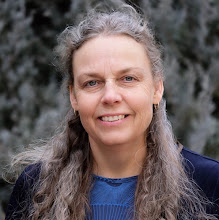How many ways of knowing are there?
Anthropologist Graham Townsley writes that the modern world is a place where two processes are happening simultaneously: the world’s indigenous peoples are adopting ways of the modern world in an effort to get the material comfort and commodities of that world, and people in the modern world are trying to understand the ways of the world’s indigenous peoples in a search for meaning.1 I am not just interested in searching for meaning, but also in broadening our definition of what does it mean to know something? Scientific knowledge is one kind of knowledge, and it has wonderful qualities and uses. It does, however, have limitations. If one of its limitations is linguistic and cultural (see "Ecological understanding & Language", 7 June), then it makes sense to try to understand indigenous ways of knowing in order to have a better grasp of all the ways humans can know.
English is the language of most scientific writing, and English has impoverished ways of talking about relationships, where some indigenous languages build ecological relationships or family relationships into the structure of the language itself. In the Yurok language of Northern California, whose speakers live beside the Klamath river, a verb has to be conjugated differently depending on whether the speaker is talking to the listener in an upstream or downstream direction. They have fifteen different ways to count, so that the number words for three people are not the same as for three redwood trees.2 In some Aboriginal languages, verbs have to be conjugated differently depending on who is speaking to who, and certain tenses and conjugations may be forbidden between certain speakers. The relationships between certain groups of people and totem animals is built into the language in Mati Ke, a northern Australian language: "Aboriginal languages have fewer words in them than English does. But those words are held and balanced in an intricate web of relationships. Lose the vocabulary and you lose the relationships."3
The ways that English describes events and time are also different from those in many indigenous languages. Benjamin Whorf noted this fact about Hopi: not all of their verbs require a subject who is doing the verb; some verbs just happen.4 This is also true of Aboriginal languages in Australia. Michael Christie, of Northern Territory University in Darwin, Australia, says, "There are amazing things about Aboriginal languages. Their concepts of time and agency, for example. They go right against our ideology of linear time – past, present and future. I reckon they’d completely revolutionize Western philosophy, if only we knew more about them."5 Even in learning Spanish, I am discovering that I have to think carefully about whether an action is continuous or discrete to choose the right verb tense.
For all of the diversity of language and thought, languages are inter-translatable, with effort. The problem is that almost no one in the colonizing world makes the effort. Other ways of thinking may be unfamiliar, but we can learn to think in those ways. "There are grammatical forms in Athabascan languages, notably to do with motion and time, or in Algonquian, to do with the animate and the inanimate, that are indeed difficult for a speaker of Indo-European languages to grasp. Grammatical categories in these…languages…are deeply unfamiliar to most other peoples of the world. Yet even in these cases, the difficulty of translation relates to unfamiliarity, not to any seeming intrinsic incomprehensibility. …I can set out what a grammatical distinction is doing, even though I may not be able to reproduce that distinction in ordinary English grammar.6 We can learn the ways of thought instantiated in other languages, but often we do not. And yet, our knowledge of the world might benefit from trying to understand the concepts held in indigenous languages.
Some languages in Northern Canada have many different words for knowing: knowing because you saw something, knowing because somebody else saw and told you, knowing because you saw it in a dream, and I can’t even remember the others, because we don’t "lexicalize" this in English.7 And yet, these are important distinctions, with most of science falling in the "knowing because somebody else saw and told you" category. It is important that we not lose these other ways of understanding knowledge. An English-dominated world is an ontologically impoverished world.
1 Graham Townsley, “Kamaroa: A revival in the Western Amazon,” 2001, p. 50. Quoted in Jeremy Narby, 2005, Intelligence in Nature: An Inquiry into Knowledge, New York: Jeremy P. Tarcher/Penguin, pp. 170-171.
2 Malcolm Margolin, 1995, "The spirit of bioregionalism," in Bridges to the Future: Proceedings of Shasta Bioregional Gathering IV, September 1995,pp. 9-19. Glen Ellen, CA: Bob Glotzbach/Regeneration Resources.
3 Mark Abley, 2003, Spoken Here: Travels Among Threatened Languages, London: Arrow Books (Random House), p. 6.
4 Benjamin Whorf, 1956, "Languages and Logic," in Language, Thought & Reality: Selected Writings, Cambridge, MA: Technology Press of Massachusetts Institute of Technology.
5 Quoted in Abley, 2003, p. 277.
6 Hugh Brody, 2000, The Other Side of Eden: Hunters, Farmers and the Shaping of the World, NY: North Point Press, pp. 49-50.
7 Brody, 2000.


0 Comments:
Post a Comment
<< Home